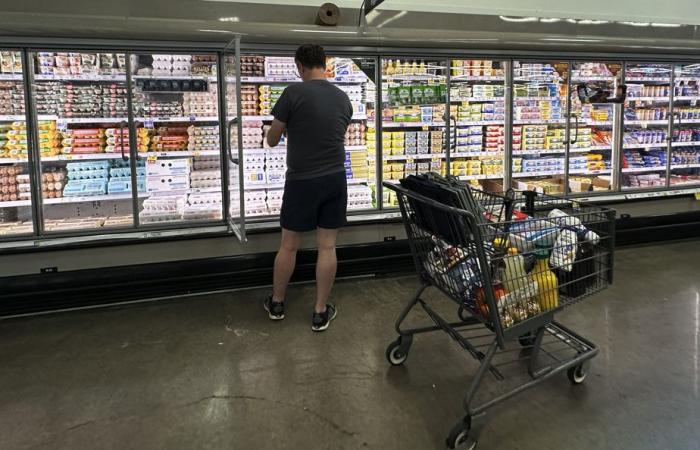The arrival of Donald Trump at the White House is likely to be felt even in the grocery aisles of Quebec and even on the floors of certain retailers, such as hardware stores.
Posted at 3:34 p.m.
The price of canola oil, sugar, orange juice and many fruits and vegetables could rise as early as next year if Mr. Trump follows through on his plan to impose a 10% tariff. on products entering the United States.
“We have a lot of commodity products that go directly to the United States and come back here transformed,” underlines Sylvie Cloutier, president and general director of the Conseil de la transformation Alimentaire du Québec (CTAQ), at the end of the line.
She gives the example of Prairie canola, which we sell to our neighbors to the South, who make oil from it. Once processed and bottled, it crosses the border again towards our grocery shelves. However, the imposition of the customs tariff will increase the price of canola, consequently, the oil made with the raw material should also be more expensive when the time comes to check out.
On the other hand, the Canadian government’s response, if there is one, could also have an upward effect on the grocery bill, says M.me Cloutier. “Will the Canadian government let the United States impose a 10% tariff on all of its imports without doing anything? she asks herself. I would be surprised if he didn’t react. »
In the event that Canada in turn imposes a customs tariff, products from the United States will also cost more: out-of-season fruits and vegetables, sugar, several processed products. And not to mention the orange juice made here… with citrus fruits from Florida.
Sylvie Cloutier emphasizes that protectionism is not, however, the prerogative of Donald Trump. The Democratic candidate, Kamala Harris, also wanted to put in place certain measures to protect jobs and encourage businesses to set up on American soil.
“At the food level, we must not underestimate the volume of inputs that pass between our two countries,” recalls Pascal Leduc, president of Leduc Strategy and commercial management consulting. Americans will also see increased prices. »
Rising prices, a hard shock for SMEs producing finished products and inputs, and job losses are to be expected, according to him.
Furthermore, would the watchword to consumers be to buy more from Quebec in order to save some money? “We always say that,” Sylvie Cloutier responds straight away, “but the fact remains that in Canada we are still limited in terms of access to inputs to manufacture products here due to the climate. »
Also at your hardware store
Attention entrepreneurs and Sunday DIYers: the price of nails, screws, wood and other hardware items will probably not escape an increase either. The availability of certain products may also be less, according to Richard Darveau, president of the Quebec Hardware and Construction Materials Association (AQMAT).
“By choosing “America First”, the next government [des États-Unis] will necessarily encourage its national manufacturers to favor their production on its domestic market, he analyzes. These manufacturers will have to pedal to satisfy the American market. Consequently, we can predict that our hardware stores will struggle to source materials made in USA and that these will possibly be offered to them at higher prices than today. Moreover, who knows if the barriers raised against Chinese products will not be imitated by Canada? »
Donald Trump has in fact threatened to impose customs tariffs of 60% on products from China. “In such a context, in my opinion, our governments here have a great opportunity to vote on measures to encourage more local purchasing,” argues Mr. Darveau.
E-commerce
François Roberge, CEO of La Vie en Rose, a Quebec retailer of underwear, pajamas and swimsuits, recently opened two stores in the United States. However, he does not think that the election of Donald Trump will have an impact on his sales there. On the other hand, if the new measures are put in place, he risks feeling an impact on the orders he ships from here to Uncle Sam’s country.
“What scares me is what concerns web orders. You can send a web order to the United States without paying customs if the amount is less than $800. I don’t know if that will change. »
“At the end of the day, no matter what the U.S. government does, the customer is going to pay, whether it’s here or there. »






